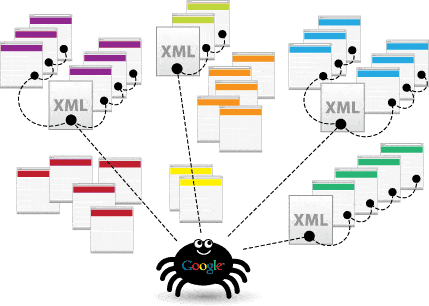Mapping your website to be search engine friendly is necessary and the XML sitemap is one of the underestimated and commonly neglected search engine optimization strategies. Sitemaps are called “the maps” because they form a map of your site which helps your website to communicate with the search engine better. Google, Bing and Yahoo are the major search engines that read through a website sitemap to produce better search results. If you have not been giving much attention about generating your website XML sitemap, you are likely weighing your options whether to generate one to your website or not. Here are some insights that can help you obtain a better insight into the importance of XML sitemaps to the search engines.
XML sitemaps allow your website to communicate with the search engine
SEO experts use XML sitemaps to allow your website to communicate better to the search engine. While XHTML uses codes that will allow your website elements to communicate with your human website visitors, the XML sitemaps are the channel used by the search engine to understand what your website is all about.
The sitemap uses XML file that provides the list of your website URLs together with the metadata for each of the URL that will help the search engine spiders to crawl your website for new changes and updates. The search engine spiders or bots crawl on the web pages through the links within and outside the website. With an XML file on your site, you are able to supply more data for search crawlers to evaluate your site URLs and its associated metadata.

Here are some of the beneficial features of using XML sitemap to your website:
- XML sitemaps enable the search engine algorithm to understand the essence of your web page content that you want to be indexed from your website.
- XML sitemaps can be a tool in simplifying the indexation by the search engine on the multiple postings and dynamic contents found on your website. It is the easiest way of indicating to the search engine that a new content is published on your site and to index it accordingly.
- XML sitemaps can be used by small and static websites to remind the search engine to check and re-evaluate what it considers to be unqualified pages for new posts and updates.
- XML sitemaps can help your website recover from web pages that were hit by the Google Panda especially when you have a larger website.
Professional SEO’s insights about XML sitemap
It helps to understand that an XML sitemap merely provides hints to the search crawlers on how to improve its ability to understand your website and does not guarantee that using such will make your web pages rank higher on the search engine results. What a web crawler does is discovering web pages through the links within the site as well as from other sites. From the Google’s SEO professional Matt Cutts who is in authority to point out the relevance of XML sitemaps for better search engine ranking, he explained that the XML sitemap is best in helping the search engine to discover new web pages although it doesn’t guarantee that the search engine will crawl is for a better Google search result. The downside about the XML sitemap is that it is only readable by the search engine and not by human website visitors. However, Cutts emphasized that as much as you can integrate an XML sitemap to your site do so because the Google search engine loves to crawl fresh and newly updated web pages.

Integrating XML sitemap to your website
The use of an XML sitemap can help in your on-page optimization efforts. Mark Jackson, in his article on Sitemaps and SEO: An Introductory Guide explained that XML sitemaps can help web page content get indexed by the search engine better. What is equally important is to make your web page content URL feed the proper signal to the search engine. Here are some important points to keep in mind when you should use an XML sitemap:
- If your website contains just a few web pages, generating an XML sitemap is not necessary.
- The use of a sitemap on your web page content is most beneficial when you maintain a dynamically bigger website with lots of content.
- Your site is new or has just been updated with a few new links to it, or your website has numerous contents with links not connected to each other.
Should you generate XML sitemaps to your website?
The decision whether you want to integrate XML sitemaps to your website will depend upon many factors. SEO Experts view XML sitemaps, not as a guarantee for increasing your website ranking however it can potentially help the search engine in indexing your website to improve your search rank. The indexation of your website is not guaranteed for every page of your website and the use of an XML sitemap will remind the search engine to crawl some of the “neglected pages” on your site. It is a way of telling the search engine to check the new pages of your site within a certain period of time. While the process will not boost your search ranking, it is a good way of ensuring that your web pages are properly indexed more quickly.